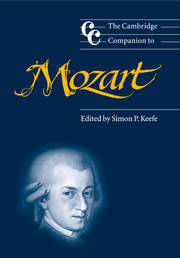Book contents
- Frontmatter
- Introduction
- Part I Mozart in context
- Part II The works
- 5 The keyboard music
- 6 The concertos in aesthetic and stylistic context
- 7 The orchestral music
- 8 Mozart's chamber music
- 9 Mozart as a vocal composer
- 10 The opere buffe
- 11 Mozart and opera seria
- 12 Mozart's German operas
- Part III Reception
- Part IV Performance
- Notes
- Selected further reading
- General index
- Index of Mozart’s works
11 - Mozart and opera seria
from Part II - The works
Published online by Cambridge University Press: 28 September 2011
- Frontmatter
- Introduction
- Part I Mozart in context
- Part II The works
- 5 The keyboard music
- 6 The concertos in aesthetic and stylistic context
- 7 The orchestral music
- 8 Mozart's chamber music
- 9 Mozart as a vocal composer
- 10 The opere buffe
- 11 Mozart and opera seria
- 12 Mozart's German operas
- Part III Reception
- Part IV Performance
- Notes
- Selected further reading
- General index
- Index of Mozart’s works
Summary
Mozart is treasured today for his opera buffa and Singspiel, the foundation of the modern repertory. His serious Italian operas belong to the most abundant operatic genre of the eighteenth century, and share its modern neglect. Yet there is no reason to suppose that Mozart despised the rhetorical grandeur of opera seria, with its cast of tyrants, suffering princesses, courtiers and soldiers, and its plots of treachery overcome and magnanimity in suffering. It played a larger role in his pre-Vienna works than any other type of opera, and was by no means neglected thereafter. Mozart was brought up on opera seria, and an opera seria was his last stage work.
The majority of Mozart's serious operas were composed for specific occasions connected to the Austrian ruling house of Habsburg, yet none was written for its capital, Vienna. What today we loosely call ‘opera seria’ comprised a number of sub-genres, selected according to the circumstances of a commission. For Milan, Mozart composed two traditional opere serie, Mitridate, re di Ponto, and Lucio Silla. Such operas acted as a mirror to the upper echelon of society, and an enlightened monarchy is directly reflected, or indirectly admonished, when the tyrant sees the light and forgives his enemies. Although concerned almost entirely with aristocratic characters, this kind of opera seria, whose form was established by the librettist and Imperial poet Pietro Metastasio, was designed for public theatres; yet in a city such as Milan, governed by the Austrian Archduke Ferdinand, the court certainly attended the premiere.
- Type
- Chapter
- Information
- The Cambridge Companion to Mozart , pp. 147 - 155Publisher: Cambridge University PressPrint publication year: 2003



